





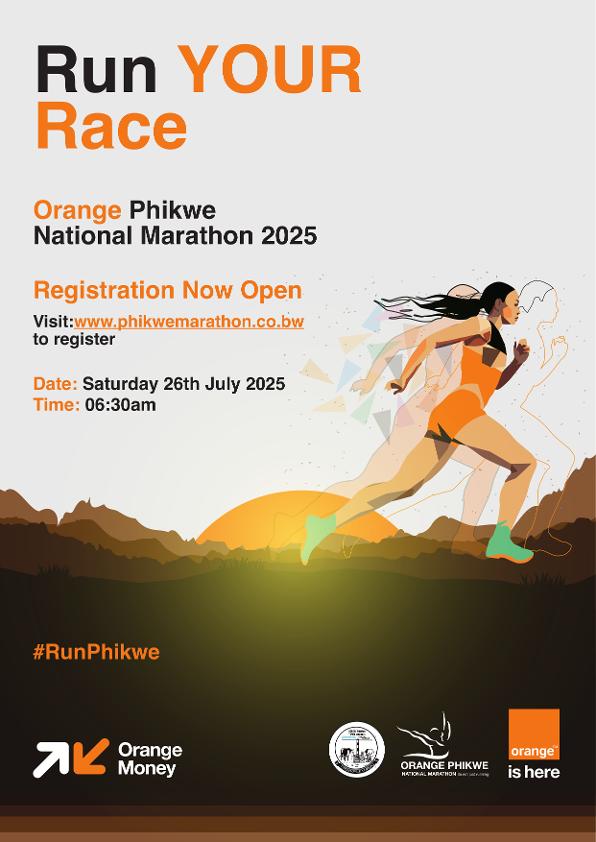


STANBIC GOLF CLUB
LATEST EPL NEWS
NEW HOPE FOR SPORT UNDER Hon. JACOB KELEBENG
SPORTS LONGEVITY
SCANIA BACK ON SOFTBALL HOT SEAT
SPORTS UNIONS

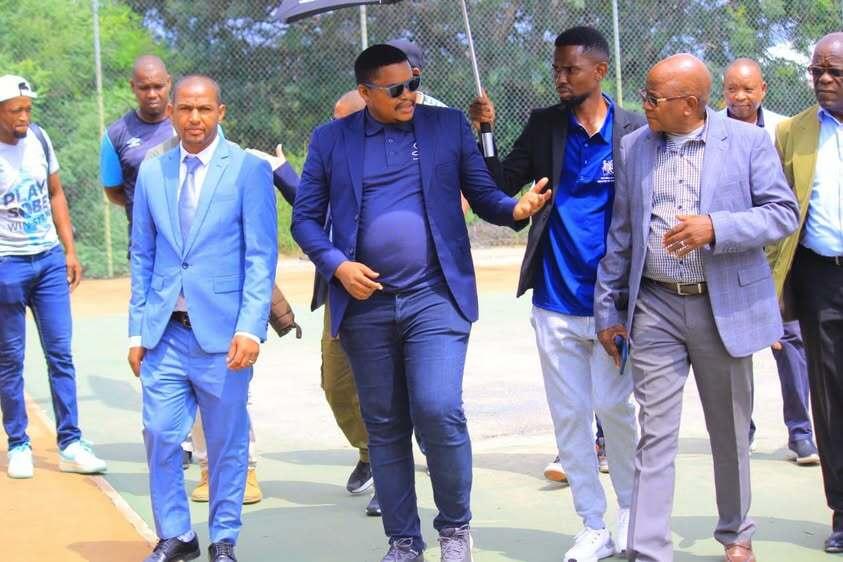
















STANBIC GOLF CLUB
LATEST EPL NEWS
NEW HOPE FOR SPORT UNDER Hon. JACOB KELEBENG
SPORTS LONGEVITY
SCANIA BACK ON SOFTBALL HOT SEAT
SPORTS UNIONS









FROM CRUMBLING STADIUMS TO FRAUD, CHOPPING AND CHANGING OF ADIMINISTRATORS AND DETERIORATING INTEREST IN OURr OWN TEAMS IN FAVOUR OF FLAMBOYANT EUROPEAN TEAMS, THERE IS A GREAT DEAL OF WORK TO DO TO RESTORE FOOTBALL TO THE BEAUTIFUL DAYSOF THEYESTERDAY.
Mpho Mooka
PERSPECTIVESPORTS
1. Leadership: Crisis at the BFA
African football has been stuck in a time warp, mainly due to a waning leadership that increasingly appears to be out of touch with reality. There is always powers behind these chops and changes of administrators who have proven track record in favour of those aligned to powerful figures or associates: Let?s look at this disease whipping African Football as a whole
Since Issa Hayatou was catapulted to head the Confederation of African Football (CAF) in 1988, football on the continent has had few triumphs to talk about and now lags behind Asia, which has slotted in behind Europe, South America and lately Middle East
Hayatou?s much-trumpeted achievements that include increasing the number of African teams to the FIFA World Cup and bringing football?s premier competition to Africa have both little and no association with the man who has had an iron grip on the leadership of African football for many years
The size of African membership, currently 54, makes it the largest voting block during FIFA elections Any candidate wishing to win the presidency needs to secure the African vote Inevitably, Africa receives most-favoured status? and this has been reflected in the increase in World Cup places African football has also been the main beneficiary of the Financial Assistance Program and Goal Projects
More recently, CAF?s shortcomings have been high-lighted by the farcical African Player of the Year awards At a point, none of the contenders bothered to
show up and the ceremony itself was a shambles, ending up more like a music festival than an awards night
Commercially, the Africa Cup of Nations continues to be a burden on the countries that take part The winners of the previous tournament walked away with an improved $4m and all the participating countries that spent millions of dollars in qualifying for, and taking part in, the competition received little or no commercial benefit Meanwhile, CAF, sports agency Sport Five and broadcast partner, LC2, reaped millions of dollars
Two decades ago, thousands of football fans across the African continent flocked to stadiums to watch their local club sides in action, and league football thrived as Africa?s players sought to make their mark domestically before hopefully winning a contract to play in Europe
Today, the terraces hold a fraction of the audiences who once sat enthralled in anticipation and the prospects for African league football look bleak
The story of the domestic game on the continent has two sides In North and Southern Africa, the more advanced economies of these territories enable the clubs to retain some of their talent and so the football ?brain drain?is not so pronounced
A look at the squads for the 2010 Africa Cup of Nations reflects this: Egypt won the tournament with only three overseas players among the 23 who made up the squad, while Tunisia?s and Algeria?s squads had a reasonable representation of domestic players
The West African teams Nigeria and Côte d?Ivoire, on the other hand, had 23 and 22 overseas players respectively
So, while Ahly, Zamalek, Esperance and Etoile du Sahel are still able to draw sizeable crowds for domestic matches in North Africa, it is a different story across much of sub-Saharan Africa, with clubs battling to get fans into the stadiums
Much of Africa?s top talent play football outside of their own countries, so while the national teams bring multitudes of fans hoping to see their stars in action, which has sometimes led to mass hysteria, stampedes and even stadium deaths, club football has no such effect
Across the continent, the fans of Gor Mahia in Kenya, Kampala City Council in Uganda, Mufulira Wanderers in Zambia and Rangers in Nigeria now put on Manchester United, Chelsea, Arsenal and Liverpool shirts and debate the league fortunes of these clubs rather than their own local giants The drift in passion is understandable English, Spanish, German and Italian football is available on
satellite TV and though the costs of obtaining the equipment and paying subscriptions is beyond the reach of most people, access is easy in bars and informal viewing centres where shrewd businessmen charge an entrance fee to watch Lionel Messi, Ronaldo, Neymar and many others at the expense of local football
With infrastructure crumbling across much of the continent giving rise to comfort and security problems in derelict arenas, fans have opted to stay away The game hasn? t been helped by the sub-standard fare on offer, with the best players often snapped up as soon as they show the slightest potential to entertain European and Asian football fans at Africa?s expense Given the fact that domestic players in many cases earn a few hundred dollars a month, who can blame them for looking for the opportunity for a better life and the chance to earn amounts of money that they could previously only dream about?
While African football has come of age, with the continent?s stars now household names in the international game, much of the players?success can be attributed to their individual efforts to make it rather than to any deliberate effort by African football to develop the game
Across much of the continent, the game?s infrastructure is crumbling due to corruption, lack of investment and neglect

While each country is likely to boast a state-of-the-art Chinese-built national stadium which proudly hosts matches of the national team, further down the scale, clubs play in crumbling dust bowls in front of a few hundred loyal fans There are exceptions South Africa?s hosting of the 2010 World Cup meant the country now have at least a dozen world-class stadiums, even though questions have been raised about the economic viability of some of them, given their location in less-populous parts of the country
Ghana and Angola, hosted of the last two Africa Cup of Nations events, built and renovated their stadiums and now have some high- quality playing arenas that will serve them well for many years to come.


The same can? t be said for many other countries Zambia, once a power-house of African football, is a sad testimony to the decline of football on the continent The home ground of Zambia?s Nkana Football Club, once one of the giants of the continental game, looks more like a scrapyard than a football stadium The national team has been forced to play football in a small 15,000-seater arena in the north of the country because the national stadium closed more than three years ago for renovations?still lies abandoned by builders with its main stand demolished and awaiting rebuilding
Few years ago, as thousands of fans crammed into the alternative arena in Chililabombwe made their way out of the stadium after an international match, 12 people were killed in a stampede Similar scenes have occurred in Côte d?Ivoire and Ghana
While football in the rest of the world has advanced to new heights, with marketing and television fuelling the rise of the game, much of African football remains stuck in a time warp Again, North Africa leads the way, with Egypt, Tunisia, Morocco and Algeria running leagues that are well sponsored and with revenues pouring in from domestic television companies
South Africa?s league is ranked as seventh in the world in terms of sponsorship, with the deal between the Premier Soccer League, Betway, South African Breweries and broadcaster SuperSport raking in approximately $280m over a five-year period So, it is not all gloom and doom for African football. The onus is, however, on the leagues of African football to take the game to the next level
The bane of much of Africa, and indeed much of the world, the scourge of corruption has not allowed football to escape Any team travelling to international assignments will invariably return home with tales of suspect refereeing and the difficulties of succeeding abroad
The corruption in African football transcends the field of play Two years ago in Ghana, two teams on the verge on promotion both needed victory on the final day of the season
The matches ended 31-0 and 28-0 respectively In the Nigerian premier league, the official broadcaster has occasionally run into difficulties in carrying out live broadcasts at certain venues where clubs sought to prevent the open bias of referees being viewed on live television
While corruption in football is a recognised fact worldwide, poverty on the continent and the win-at-all-costs attitude of some of the clubs makes referees susceptible to bribery and other inducements In the qualifying series for the 2002 World Cup, Nigeria gave their opponents, Ghana, $25,000 after Nigeria beat them to qualify It caused much controversy, but the Nigerian?s declared that it was a gift in line with African culture The Confederation of African Football (CAF) conveniently looked the other way
During the qualifying series for the 2010 World Cup, one West African country on the verge of elimination from the competition despatched a football association committee member with a bag full of money to visit both their own and their rivals?opponents prior to matches to ensure that the road to qualification was smoothed over They qualified against all odds
This also extends into the halls of power where the benefits of becoming a committee member of CAF can cost thousands of dollars in payouts to the voting members of the confederation?s congress The night before elections is when candidates will not hesitate to hand over envelopes of cash to ensure that they achieve victory
As a result, African football is not led by the best candidates for the job but by those who have the means to disburse the largest amounts of cash
The fact that football has the resources of large corporations at its disposal but none of the governance makes it an ideal vehicle for those who have no compunction about enriching themselves at the expense of the game Is BFA heading there, only time will tell


Selebi-Phikwe just got a major lifeline Orange Botswana (OBW) has announced a game-changing P1 million sponsorship annually for the next three years to power the Phikwe National Marathon, with the goal of reviving the town?s economy and positioning it as a sports tourism hub
This bold commitment will inject P3 million into the marathon from 2025 to 2027, making it one of the most heavily backed sporting events in Botswana ?This is bigger than a race; it's about jobs, tourism, and putting Selebi-Phikwe back on the map,? said Orange Botswana CEO Néné Maïga at the launch event ?We?re investing P1 million a year because we believe in the power of sports to move economies and transform lives ?
Since the closure of the BCL Mine, Selebi-Phikwe has been fighting to reinvent itself The marathon first backed by Orange Botswana in 2016 has grown into a key economic driver, drawing thousands of runners and fans from across the country and beyond With this fresh injection, the marathon is set to scale new heights, bigger prizes, better logistics, more
volunteers, and next-level visibility through OBW?s cutting-edge digital platforms. Expect live race tracking, social media takeovers, and a serious push to position Selebi-Phikwe as a must-visit destination
?Every runner brings business Every spectator supports a vendor. Every cheer echoes growth,? added Maïga ?We?re proud to back this event not just with money, but with purpose ?
?At Orange Botswana, we see sports as a powerful development tool that builds character, drives discipline, and opens doors for young talent. This marathon is a launchpad for the next generation of champions,?Maïga emphasized
The 2025 edition, slated for August, promises to be the most ambitious yet. Organizers are gearing up for record participation, enhanced infrastructure, and vibrant community engagement
The Selebi-Phikwe Town Council and Local Organising Committee hailed the deal as "turning point" for the town With this renewed backing, Orange Botswana is doubling down on its belief that sports tourism is the next frontier for economic development in Botswana

What is the current situation with Sports since you took over the office?
Botswana has grown in strength in various categories such as women football, Athletics (400m, 800m and lately 100m and 200m) motorsport and cricket As much as we may be doing well, there is a lot of room for improvement
What plans do you have in place for Sports revival, we have seen some sporting codes fading away like boxing, karate and softball, these used to be consistent and earning us medals
The Ministry of Sport and Arts intends to promote mass participation in sport and recreation activities, sport development and management identification by:
Gender mainstreaming in sport;
Re-introduction of school sport, review its organisational operation structure, review of Centres of Sport Excellence, renovate school sporting grounds, resource, reward and capacitate teachers;
Development of a comprehensive plan for systematic talent identification and nurturing, investment in domestic leagues and tournaments;
Establishment of District sport structures and High Performance Centres;

Capacity building of coaches and other officials;
Increasing participation at national, regional, continental and international competitions;
Utilisation of accredited sport science service providers;
Development of inclusive sport programmes;
Investing in sport academies;
Empowering selected National Sporting Associations to effectively implement and execute their sporting development programmes nationwide; and
Reviewing and harmonising all sport development programmes administered by Botswana National Sport Commission and National Sport Associations to reduce cost duplications
Sports Development, we have one of the best development programmes in ?Reba bona ha? which has produced some of big names in Sports, what measures do you have in place to restore this?
Our intention is to evaluate at all the sport development programmes and initiatives with a view to establish the extent to which they deliver intended results Then based on the outcome of the evaluation, decisions will be taken on the way forward



Do you think the sporting codes should be kept the way they are bearing in mind that the government is struggling to maintain them Do you ever think about reducing them
National Sport Associations should be capacitated to be able to secure necessary resources for their operations and funding of sport development programmes The Ministry is in the process of establishing a Secretariat for Botswana Athletics Association with an intention to capacitate it to run its affairs Resources permitting, other NSAs will also be assisted in a similar way in the future
Reducing the number of sporting codes is not the answer In fact, the more the codes, the more options there are for Batswana to choose their preferred sport, and be physically and mentally active.
Reinstatement of School sport is a priority to the Ministry We have reached out with an intention to initiate consultations with all stakeholders with a view to reach an agreement that will facilitate commencement of school sport It is not only about sport, all other co-curricular activities such as music, crafts, arts, creativity and innovation will be included in the engagements with a view to reintroduce them in schools
Empowerment of athletes, do you have any ideas about how to educate our athletes, both socially, financially and just moral behaviour.
Several Programmes are in place to empower our athletes. One of these programmes is the National Anti-Doping Programme, which is intended to ensure that the athletes understand the risks of performing enhancing substances The Ministry in collaboration with the Alcohol Levy fund implemented an initiative that was intended to raise awareness on the adverse impacts of alcohol, substance and drug abuse.
When do you think we can expect a visible turn around with your vision?
Since Sport Development is a process, the complete turnaround is expected to be visible in the four years However, we should be experiencing signs of improvements particularly in the performance of our junior national teams.
Your last words to our readers
Investment in grassroots development of athletes is critical for ensuring that there is continuity in the production of elite athletes that are competitive at the highest level I therefore plead with all stakeholders to contribute to and invest in this process.
As the world of sport continues to push toward excellence and peak performance, it is important to first address the foundational development of the athlete in order to sustain longevity and success in their respective sporting endeavors. The era of just showing up for practice and games is no longer enough to remain relevant in sports, science and psychology are now at the forefront of developing athletes of the future Here, the goal is not just to compete but to sustain performance over time. How does one do that, you may ask? There are many factors that contribute to a long and successful athletic career, including proper rest, understanding ultradian rhythm breaks (URBs), self-care, intuition, and having a growth mindset. By focusing on these key elements, athletes can optimize their training, reduce injury risk, and extend their competitive years
The Power of Rest and Ultradian Rhythm Breaks (URBs)
The importance of rest in the life of an athlete cannot be emphasized enough. Rest is not a sign of weakness; it is an essential component of success Rest is programmed within our DNA Ultradian rhythm is a naturally occurring, physiological built-in rhythm for humans We are surrounded by natural cycles and rhythms in our life. Think about our breath, heartbeat, sunrise/sunset, night/day, ocean tides, awake/sleep, and the changing seasons They follow a natural cycle Our ultradian rhythm is our naturally occurring activity-rest cycle which takes place in our body over the course of 24-hours. For

GrayShaneberger, MHS, PAC, CIHC
Retired professional athlete
Dr Kagiso NellyTlhabano-David, PhD
Psychologist (Counselling& Sport)
IOCCertified SafeguardingOfficer in Sport
Commonwealth Alu

every 90-120 minutes of work, our bodies experience significant energy and alertness, followed by a period of fatigue and the need for rest and recovery Many studies on athletes, musicians, chess players, and writers have shown that intense bursts of work followed by periods of rest are necessary for maximum performance and effectiveness For every 90-120 minutes of work, we need to incorporate 20 minutes of rest Mind you, rest is not sleeping. Rest is breathing, meditation, writing, reading, and dancing - as examples Essentially, rest is anything other than what we were previously doing By regularly engaging in breaks (URBs), we are restoring our natural balance, we are re-instating our natural and physiological rhythm URB benefits include mind-body regulation, clearer thinking, tissue repair, energy production, increased hand-eye coordination, increased focus, increased creativity, and improved emotion regulation Without adequate rest, even the most talented athletes will eventually see declines in performance, and an increased risk of injuries, and a deterioration in their mental health
Prioritizing Self-Care and Trusting Your Intuition
Beyond training, self-care is a critical factor in sports longevity. Proper nutrition, hydration, mental health maintenance, and regular physical therapy should all be part of an athlete?s routine Small but consistent habits, like stretching, massage therapy, and meditation, can add up to a significant impact over the years. Remember that no one knows your body better than you do Therefore, while coaches and trainers provide guidance, it is crucial to develop a strong connection with your body and recognize the early signs of fatigue, pain, or imbalance. Pushing through discomfort and ignoring early signs of imbalance can lead to serious injuries and disrupt a promising season or worse, career Learning to pay attention and trust your intuition, and to make necessary adjustments can be the difference between a short-lived
career and a long, healthy, enjoyable one. The Growth Mindset Advantage
Intelligence and talent are just the starting point toward achieving an athlete?s full potential and longevity Having a growth mindset is all about the attitude with which we face an obstacle or challenge. It is about how we process setbacks and failures A growth mindset is key in how we adapt and evolve in the face of challenges Athletes who embody a growth mindset are always looking for ways to improve, whether through learning new skills, new strategies, or new techniques With a growth mindset, when we encounter setbacks or obstacles, we view these not as barriers to progress but as opportunities for growth. Athletes with a growth mindset never surrender to challenges or frustration, instead they focus on lessons gained from these hardships They can therefore expand, grow, and stretch themselves to their fullest potential. In this, athletes gain the belief that their potential is elastic provided they keep putting in effort, rather than quitting When we believe that our capacity to improve our own talents is unlimited, failure and frustration stop being something to be frightened of. Instead, we approach frustration with optimism and confidence, which propels us to become abundant and achieve prolonged success in all we do With a growth mindset athletes can prolong their career.
Dear reader, longevity in sports is not just about natural talent? it is about taking a proactive approach to training, recovery, and mental well-being By prioritizing rest, practicing self-care, trusting intuition, and embracing a growth mindset, athletes can extend their careers and continue to perform at their best for years to come The goal is not just to compete today? it is to thrive for a lifetime


BY Mpho Kelosiwang (Excel Golf Academy)
I recently conducted a Level 1 Golf Coaching Course in Gaborone, Botswana on the 16th and 17th November 2024. As a result of this, I was invited to Btv to share more information about the course During the interview the presenter asked me an interesting question, why is Botswana not producing World Class talent, I countered that by saying we are already producing World Class talent, however it is yet to reach the elite levels Developing talent takes time I would therefore like to use my space to expand and further elaborate on this.
I generally believe that in terms of Junior Golf, we already have world class talent We already have kids competing and doing well in national, regional and international events, especially at under 15 age category I should hasten to point out that, I am not a big fan of hyping kids and attaching world class status to them If not managed properly it can derail a great potential and talent I should point out that success at one age group is not a guarantee for success in other or older age categories.
It is however an indication of potential There is however an exception to the rule, once in a generation talent, that requires one to pause, sit and evaluate their beliefs and principles, where one can gamble without the fear of being proven wrong in the Future? It is my argument Ladies and Gentlemen that we have among us a Gem! We need to be careful how we deal with it to ensure they fulfil their potential That is Hamzah the Lion.
Managing talent is exciting, tricky and
sensitive. Exciting because of the potential of what can be achieved Tricky because you are dealing with and individual who is also growing and getting to know themselves, sensitive as it is time bound, and one misstep can have permanent, irreversible and dire consequences It is important while dealing with talented kids that we are sensitive to their needs and wants, we get to know what makes them excited and motivated to give their best, most importantly we need to understand their fears and pain points. It is for these reasons that we do spend time to listen and appreciate their perspectives and view of the world in order to have a better understanding of the person, not the athlete
It is our argument that at his age group, Hamzah Mahomed is world class. He has achieved a number of accolades nationally and internationally some of which we will mention below Hamzah started golf at a very young age, he used to hit the ball with plastic golf clubs in his backyard. He then progress to the Driving Range and his first coach was Phenyo Lekgoa They spend about twelve to fourteen months together until he enrolled with Excel Golf Academy It has been our pleasure and privilege to work with Hamzah the Lion, he has grown to be a determined young boy, who is focused on success Hamzah separates himself from his age mate through hard work, competitiveness, curiosity and willingness to try new things. While we do occasionally make him cry, as he doesn? t appreciate the sheep-dog and repetitive type training, he does however understand the process and task orientation we do need at time.
Over the last three years, Hamzah Mahomed has won multiple Botswana Junior Golf League games, multiple SA Kids Golf events and Numerous US Kids events In August 2022

"Over the last three years, Hamzah Mahomed has won multiple Botswana Junior Golf League games, multiple SA Kids Golf events and Numerous USKids events."
placed 3rd at the Junior Africa Challenge in San Lameer In July 2023 placed 3rd at the Champion of Champions in Northern Ireland, which was the first for a Botswana Resident In February 2024 Hamzah won the World Championship Qualifier at Huddle Park and March 2024 he placed 3rd in Boys 7 at the Big 5 South Africa Open In April 2024 he won the Boys 7 category at the Delta Botswana Junior Championship and the Botswana U11 Order of Merit where he also qualified for Champion of Champions, Asian Master 2025, and other invitationals
As outlined above, Hamzah is just but one example of world class talent we have in the country, it is a pity that the sport of golf is in relative obscurity and background. I don? t expect everyone to agree with me on this one, I am also willing to be wrong I am excited however to prove you all wrong as I believe in less than a decade this will sound so prophetic? .I must hasten that this is only about Hamzah and it doesn? t in any way reflect negatively on other Excel Junior Academy students whom I equally believe to be talented Their time for the spotlight will come
For a young boy, Hamzah is ambitious, he wants to be the best golfer in the World, first at Amateur and then at PGA Tour level We believe that this is attainable as he loves the sport, enjoys challenges that this beautiful game throws at him He is one of the hardest working in the region. We do understand the risk involved and the need to manage his load to avoid fatigue, exhaustion and overuse injuries It is important to note that Hamzah has not reached the optimal training window for sport skill which occurs at the ages of 9-12 for boys It is therefore scary of what Hamzah can achieve in his quest for elite level domination
Why do I believe we can be World Class?
Over the years, Botswana Golf has been putting in place foundation for the development and promote golf in Botswana. Botswana has developed and Capacitated coaches to world class standards, Has one of the best driving ranges in the southern hemisphere and international level golf courses
What is currently lacking is a cogent and robust Junior Development Programme that is private sector led. I don? t have great faith in the ability of the Government and National Sports Bodies to develop talent, more often than not they let the politics get in the way of excellence In addition to the above, they operate with a short term vision and not a long term perspectives as in the long run, they are voted out Talent development is a long term project that does not require quick wins, which compromise the process and long term objectives.

We are however encouraged by the tripartite initiative by the Botswana Golf Union, PGA of Botswana and Delta Sport Institute, where they recently partnered to create the Botswana Junior Golf League. The League is critical in the different Long Tern Athlete Development model as it helps the Junior Learn to train, Learn to compete and Learn to Win
Our Junior going through these crucial developmental steps is critical to our efforts to produce world beaters and world class talent It is our belief that we have the ingredients, however not in abundance, to excel, we have to be strategic on how we use these resources so that we can be World Class All we have to do is to have that belief and act as if WETRULYBELIEVE?
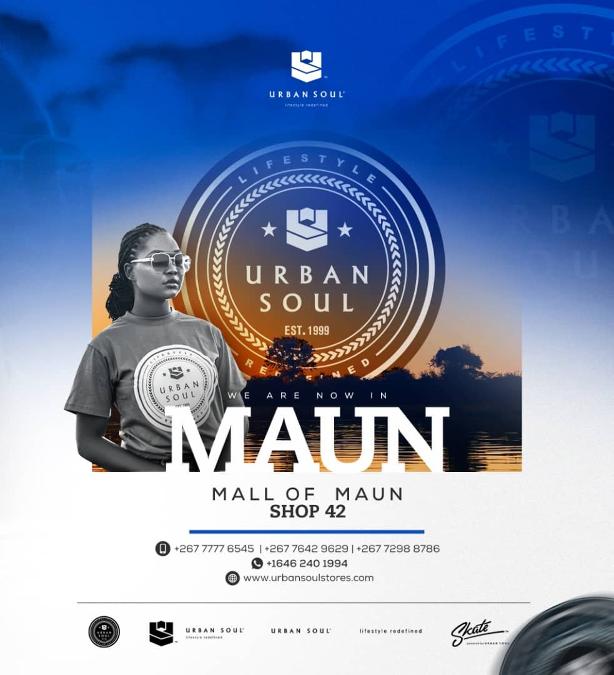


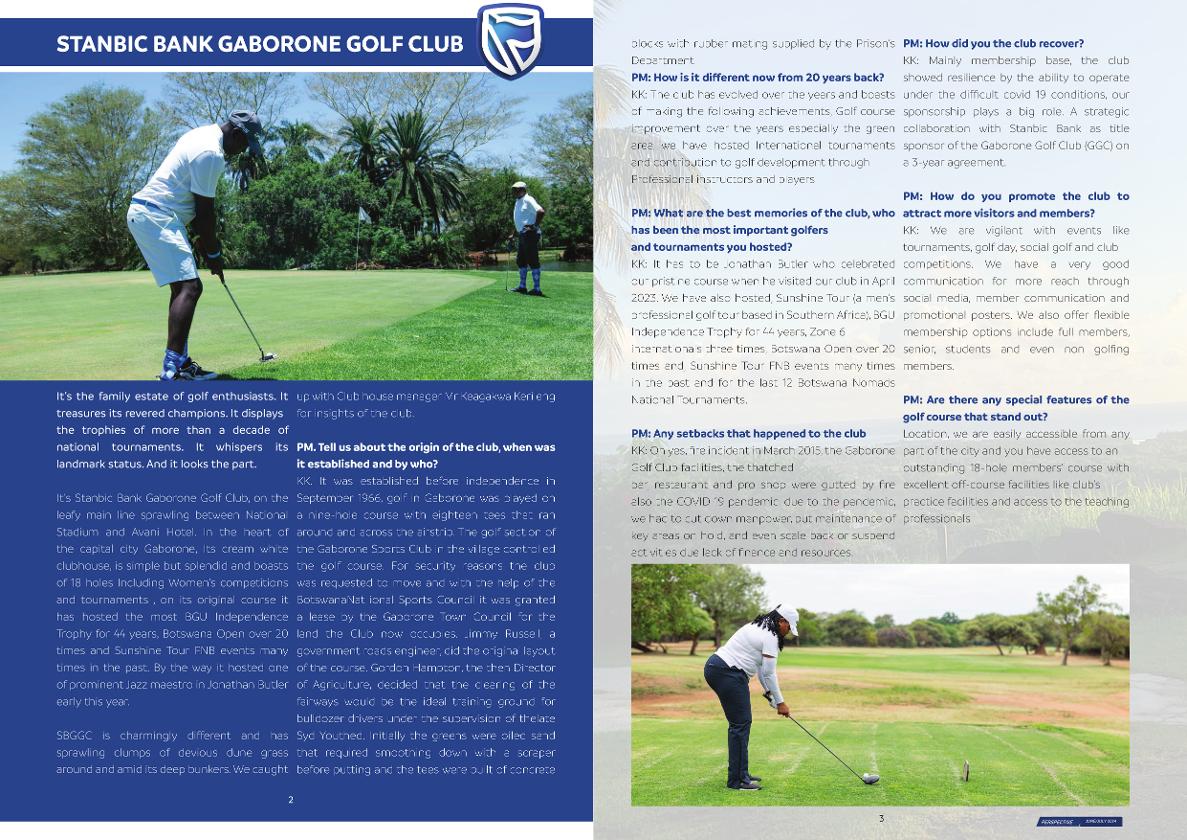




PSM: Since taking over the reins at BSA office, what are the expectations?
TM: Every time you join something new is with the hope that you bring something new to the table. So its not about comparing myself to previous softball leaders, that certainly is not our intention. We recognise the challenges the sport faces, particularly in the area of development. Our world rankings have fallen from 13 overthe years to 35. Our local ranking as a sport has dropped from a tier 1 to a tier 2 sport. That on its own presents a number of challenges. Fundamental your focus becomes less about your aspirations and more about meeting specific targets But I?m confident that we are up to the challenge, in the

short time upping our status to a tier 1 sport, in the long term moving closer to a medal at world games
PSM: Tell us about Sponsorships, any?
Currently we do not have a commercial sponsorship. We run a league funded by the BNSC, the Sports Developoment grant. Web have granted clubs P10,000 each to assist with travel costs etc, we have gifted clubs balls, and finally we will have individual prize monies after the championships next year.
PSM: What is the state of Softball in general compared to old times?
We are in the process of putting together under 15 side for girls for world games scheduled for July 2025,
This would be a first of this kind. It?s a very necessary activity, our developement has been severly hurt by lack of school sports, so we have to know double our efforts and thats why weve been very busy in that area We have hired permanent coaches for both our schools of excellence
We have been using the services of Donald ferguson as our sports developement office, him and our techical team have been busy. We are working very closely with our technical and development commision led by Mr. Bobby Gaseitsiwe, you might be familiar with hbim, has lot of experience in

Development. Well, we had an opportunity meet with the new Sports Minister and he is quite clear that he wants to be close to sports leaders, that would is necessary in some instances to cut the red tape
PSM: Lastly Scania, what is going on at the National Diamond?>
The national diamond is a sore eye, I
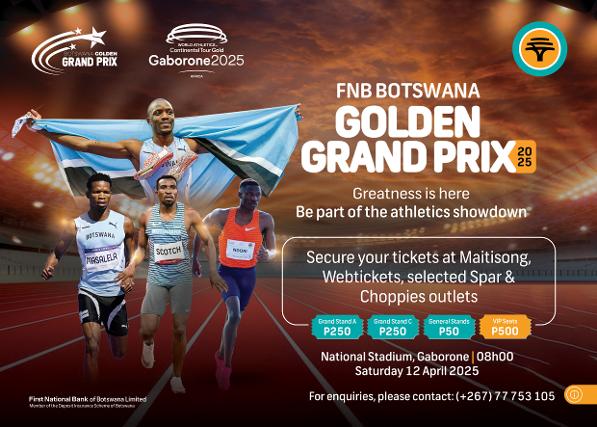



Newcastle United ended 70 years of hurt with an emotion-filled win over Liverpool in the Carabao Cup Final at Wembley. In front of 88,513 at the National Stadium, Dan Burn and Alexander Isak etched their names in Tyneside folklore, scoring the goals either side of the break that secured a first domestic trophy for Newcastle since 1955.
The Toon Army, starved of success for so long and with the raw memory of losing in this Final just two years earlier, ferociously backed their side with an outpouring of noise that was matched by a full-bloodied
and committed performance by the men in black and white on the pitch.




